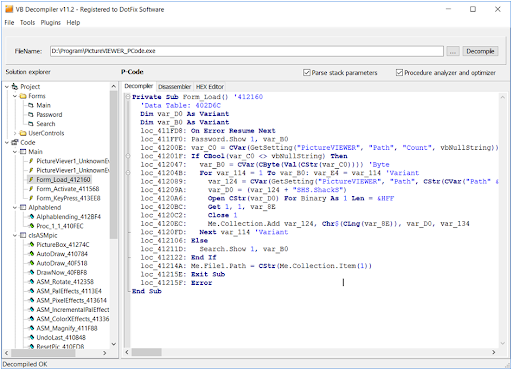EXE (Executable) files are the cornerstone of software applications, containing machine code that instructs a computer’s processor to perform specific tasks. While EXE files are typically compiled into binary form to prevent unauthorized access to the source code, there are instances where reverse engineering becomes necessary. This is where EXE decompilers play a crucial role, enabling developers and security analysts to unravel the secrets of compiled executables and gain insights into their underlying code. In this article, we delve into the fascinating world of EXE decompilers, exploring their functionality, benefits, and ethical considerations.

Understanding EXE Decompilers:
EXE decompilers are tools designed to convert compiled executables back into a human-readable form, such as high-level programming languages like C, C++, or Java. By analyzing the binary code and reconstructing the original source code, decompilers allow developers to understand the inner workings of an application, even when the source code is unavailable.
Functionality and Capabilities:
EXE decompilers use sophisticated algorithms to analyze the binary code of an executable file. By reverse engineering the machine instructions and identifying patterns, the decompiler can generate equivalent source code that closely resembles the original. While the decompiled code may not be an exact replica, it provides a valuable starting point for understanding the logic, structure, and algorithms employed in the original software.

Benefits of EXE Decompilers:
Legacy Software Maintenance: EXE decompilers are particularly useful when maintaining legacy software. In situations where the original source code is lost or outdated, decompilers can aid in comprehending the existing codebase, making it easier to fix bugs, add new features, or integrate the software with modern systems.
Security Analysis: Decompilers are essential tools for security analysts and software developers who aim to identify vulnerabilities or potential security risks in software applications. By decompiling an executable, experts can examine the code for weaknesses, analyze encryption algorithms, and detect any malicious activities that may be hidden within the binary code.
Learning and Education: EXE decompilers serve as valuable learning tools for programmers and computer science students. By decompiling and studying well-designed software applications, aspiring developers can gain insights into different programming paradigms, design patterns, and implementation techniques.
Ethical Considerations:
While EXE decompilers offer numerous benefits, they also raise ethical concerns. Reverse engineering software without proper authorization may infringe upon intellectual property rights and breach software license agreements. It is important to use decompilers responsibly, ensuring they are employed only for legal purposes, such as software maintenance, security analysis, or educational research.
Conclusion:
EXE decompiler is a powerful tool that facilitates the understanding, maintenance, and security analysis of software applications. By converting compiled executables into human-readable code, decompilers enable developers and security analysts to gain valuable insights into the inner workings of software, even when the original source code is unavailable. However, it is crucial to exercise caution and adhere to ethical guidelines when using decompilers to ensure that intellectual property rights are respected. With responsible usage, EXE decompilers can significantly contribute to software development, security, and education, empowering professionals to unravel the secrets hidden within compiled executables.
For more details please visit their website: https://exedecompiler.com/.
Media Contact
Company Name: EXE Decompiler
Contact Person: Gabriel Ford
Email: Send Email
Country: United States
Website: https://exedecompiler.com
